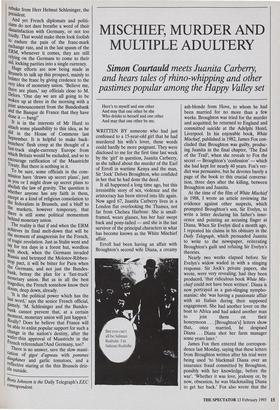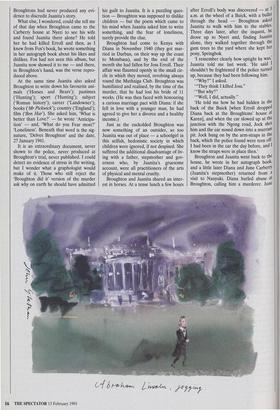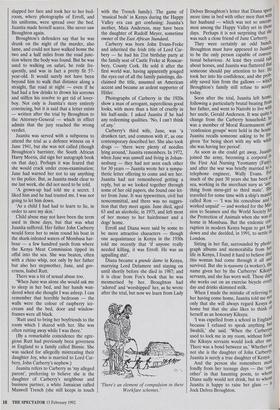MISCHIEF, MURDER AND MULTIPLE ADULTERY
Simon Courtauld meets Juanita Carberry,
and hears tales of rhino-whipping and other pastimes popular among the Happy Valley set
Here's to myself and one other And may that one other be she Who drinks to herself and one other And may that one other be me.
WRITTEN BY someone who had just confessed to a 15-year-old girl that he had murdered his wife's lover, these words could hardly be more poignant. They were disclosed to me for the first time last week by the 'girl' in question, Juanita Carberry, as she talked about the murder of the Earl of Erroll in wartime Kenya and the man, Sir 'Jock' Delves Broughton, who confided in her that he had done the deed.
It all happened a long time ago, but this irresistible story of sex, violence and the aristocracy has been stirred into life again. Now aged 67, Juanita Carberry lives in a London flat overlooking the Thames, not far from Chelsea Harbour. She is small- framed, wears glasses, has her hair swept back and pony-tailed — and she is the last survivor of the principal characters in what has become known as the White Mischief affair.
Erroll had been having an affair with Broughton's second wife Diana, a creamy ash-blonde from Hove, to whom he had been married for no more than a few weeks. Broughton was tried for the murder and acquitted; he returned to England and committed suicide at the Adelphi Hotel, Liverpool. In his enjoyable book, White Mischief, published in 1982, James Fox con- cluded that Broughton was guilty, produc- ing Juanita in the final chapter, 'The End of the Trail', when she reveals to Fox the secret — Broughton's 'confession' — which she had kept for nearly 40 years. Fox's ver- dict was persuasive, but he devotes barely a page of the book to this crucial conversa- tion, three days after the killing, between Broughton and Juanita.
At the time of the film of White Mischief in 1988, I wrote an article reviewing the evidence against other suspects, which prompted Broughton's son, Sir Evelyn, to write a letter declaring his father's inno- cence and pointing an accusing finger at Diana. When Sir Evelyn died a month ago, I repeated his claims in his obituary in the Daily Telegraph, which persuaded Juanita to write to the newspaper, reiterating Broughton's guilt and refuting Sir Evelyn's theories.
Nearly two weeks elapsed before Sir Evelyn's widow waded in with a stinging response. Sir Jock's private papers, she wrote, were very revealing; had they been produced, 'that ridiculous book White Mis- chief could not have been written'. Diana is now portrayed as a gun-slinging nympho- maniac: she 'was having a passionate affair with an Italian during their supposed engagement. She had another lover on the boat to Africa and had asked another man to join them on their honeymoon . . . [Broughton's] letters show that, once married, he despised Diana . . . Diana shot her farm manager some years later.'
James Fox then entered the correspon- dence last Monday, saying that these letters from Broughton written after his trial were being used 'to blackmail Diana over an insurance fraud committed by Broughton, possibly with her knowledge, before the war'. 'Whether it was love, jealousy or, by now, obsession, he was blackmailing Diana to get her back.' Fox also wrote that the Broughtons had never produced any evi- dence to discredit Juanita's story.
What else, I wondered, could she tell me of that day when Broughton came to the Carberry house at Nyeri to see his wife and found Juanita there alone? He told her he had killed Erroll and then, as I knew from Fox's book, he wrote something in her autograph book about his likes and dislikes. Fox had not seen this album, but Juanita now showed it to me — and there, in Broughton's hand, was the verse repro- duced above.
At the same time Juanita also asked Broughton to write down his favourite ani- mals (`Horses and Bears'); pastimes ('Hunting'); sport (`Hunting); subject (Itoman history'); career (`Landowner); books (`Mr Pickwick'); country (`England); film (Ten Hur'). She asked him, 'What is better than Love?' — he wrote 'Anticipa- tion' — and, 'What do you Fear most?' `Loneliness'. Beneath that word is the sig- nature, 'Delves Broughton' and the date, 27 January 1941.
It is an extraordinary document, never shown to the police, never produced at Broughton's trial, never published. I could detect no evidence of stress in the writing, but I wonder what a graphologist would make of it. Those who still reject the `Broughton did it' version of the murder ask why on earth he should have admitted his guilt to Juanita. It is a puzzling ques- tion — Broughton was supposed to dislike children — but the poem which came to his mind when Juanita asked him to write something, and the fear of loneliness, surely provide the clue.
Broughton had come to Kenya with Diana in November 1940 (they got mar- ried in Durban, on their way up the coast to Mombasa), and by the end of the month she had fallen for Joss Erroll. Their affair was flaunted openly in the small cir- cle in which they moved, revolving always round the Muthaiga Club. Broughton was humiliated and realised, by the time of the murder, that he had lost his bride of 11 weeks. (He was then faced with honouring a curious marriage pact with Diana: if she fell in love with a younger man, he had agreed to give her a divorce and a healthy income.) Just as the cuckolded Broughton was now something of an outsider, so too Juanita was out of place — a schoolgirl in this selfish, hedonistic society in which children were ignored, if not despised. She suffered the additional disadvantage of liv- ing with a father, stepmother and gov- erness who, by Juanita's gruesome account, were all practitioners of the arts of physical and mental cruelty.
Broughton and Juanita shared an inter- est in horses. At a tense lunch a few hours after Erroll's body was discovered — at 3 a.m. at the wheel of a Buick, with a bullet through the head — Broughton asked Juanita to walk with him to the stables. Three days later, after the inquest, he drove up to Nyeri and, finding Juanita alone, they walked together through the gum trees to the yard where she kept her pony, Springbok.
remember clearly how uptight he was, Juanita told me last week. 'He said I shouldn't be frightened if the police turned up, because they had been following him.
"Why?" I asked.
"They think I killed Joss."
"'But why?"
"Well, I did, actually." `He told me how he had hidden in the back of the Buick [when Erroll dropped Diana back at the Broughtons' house at Karen], and when the car slowed up at the junction with the Ngong road, Jock shot him and the car nosed down into a murrain pit. Jock hung on by the arm-straps in the back, which the police found were torn off. I had been in the car the day before, and I know the straps were in place then.' Broughton and Juanita went back to the house, he wrote in her autograph book, and a little later Diana and June Carberry (Juanita's stepmother) returned from a visit to Nanyuki. Diana hurled abuse at Broughton, calling him a murderer. June slapped her face and took her to her bed- room, where photographs of Erroll, and his uniforms, were spread over the bed. Juanita made herself scarce. She never saw Broughton again.
Broughton's defenders say that he was drunk on the night of the murder, also lame, and could not have walked home the two and a half miles from the road junc- tion where the body was found. But he was used to walking on safari, he rode fre- quently, and was in fact a pretty fit 57- year-old. It would surely not have been beyond him to walk that distance along a straight, flat road at night — even if he had had a few drinks to drown his sorrows and stiffen his resolve to get rid of lover- boy. Not only is Juanita's story entirely convincing, but it is said that a letter exists — written after the trial by Broughton to the Attorney-General — which in effect admits that the jury reached the wrong verdict.
Juanita was served with a subpoena to attend the trial as a defence witness on 4 June 1941, but she was not called (though Broughton's barrister, the South African Harry Morris, did sign her autograph book on that day). Perhaps it was feared that she would crack under cross-examination; June had warned her not to say anything to the police. But, as Juanita made clear to me last week, she did not need to be told.
`A grown-up had told me a secret. I liked him and he had trusted me. I was not going to let him down.
`As a child I had had to learn to lie, in order to save my skin.'
Child abuse may not have been the term used in those days, but that was what Juanita suffered. Her father John Carberry would force her to swim round his boat in the shark-infested waters of Mombasa har- bour — a few hundred yards from where the Kenya Meat Commission tipped its offal into the sea. She was beaten, often with a rhino whip, not only by her father but also her stepmother, June, and gov- erness, Isabel Rutt.
There was a bit of sexual abuse too.
`When June was alone she would ask me to sleep in her bed, and her hands wan- dered when she thought I was asleep. I can remember that horrible bedroom — the walls were the colour of raspberry ice- cream and the bed, door and window- frames were all black.
`Run used to bring her boyfriends to the room which I shared with her. She was often rutting away while I was there.'
(By a remarkable coincidence the egre- gious Rutt had previously been governess in England to a family called Binnie. She was sacked for allegedly mistreating their daughter Joy, who is married to Lord Car- bery, John Carberry's nephew.) Juanita refers to Carberry as 'my alleged parent', preferring to believe she is the daughter of Carberry's neighbour and business partner, a white Jamaican called Maxwell Trench (she still keeps in touch with the Trench family). The game of `musical beds' in Kenya during the Happy Valley era can get confusing: Juanita's mother, Maia Anderson, may have been the daughter of Rudolf Meyer, sometime owner of the East African Standard.
Carberry was born John Evans-Freke and inherited the Irish title of Lord Car- bery — he had his 21st birthday party at the family seat of Castle Freke at Rosscar- bery, County Cork. He sold it after the first world war, having apparently gouged the eyes out of all the family paintings, dis- claimed the title, assumed an American accent and became an ardent supporter of Hitler.
Photographs of Carberry in the 1920s show a man of arrogant, supercilious good looks, with more than a hint of cruelty in his half-smile. I asked Juanita if he had any redeeming qualities. 'No, I can't think of any.'
Carberry's third wife, June, was 'a drunken tart, and common with it', as one contemporary described her. She also took drugs — 'there were plenty of needles lying around,' Juanita remembers. In 1972, when June was unwell and living in Johan- nesburg — they had not seen each other for 30 years — Juanita wrote her a sympa- thetic letter offering to come and see her. Juanita had not remembered getting a reply, but as we looked together through some of her old papers, she found one let- ter from June. It was typewritten, civil but noncommittal, and there was no sugges- tion that they meet again. June died, aged 63 and an alcoholic, in 1975, and left most of her money to her hairdresser and a dogs' home.
Erroll and Diana were said by some to be more attractive characters — though one acquaintance in Kenya in the 1930s told me recently that 'if anyone really needed killing, it was Erroll. He was an appalling shit'.
Diana became a grande dame in Kenya, marrying Lord Delamere and staying on until shortly before she died in 1987; and it is clear from Fox's book that he was mesmerised by her. Broughton had `adored' and 'worshipped' her, as he wrote after the trial, but now we learn from Lady `There's an element of compulsion in these Workfare schemes.' Delves Broughton's letter that Diana spent more time in bed with other men than with her husband — which was not so uncoto" mon among the Happy Valley set in those days. Perhaps it is not surprising that she was such a close friend of June Carberry. They were certainly an odd bunch. Broughton must have appeared to Juanita to be the only person capable of convert" tional behaviour. At least they could talk about horses, and Juanita was flattered that someone should pay attention to her. He took her into his confidence, and she proli- ably saved him from the gallows — which Broughton's family still refuse to accept today.
Soon after the trial, Juanita left home, following a particularly brutal beating from her father, and went to Nairobi to live wit' her uncle, Gerald Anderson. It was quite a change from the Carberry household: he was a member of Moral Rearmament and `confession groups' were held in the house. Juanita recalls someone asking to be for" given 'for being short with my wife while she was having her period'. As soon as she could get away, Juanita. joined the army, becoming a corporal 1° the First Aid Nursing Yeomanry (Fang)' and after the war was briefly married to a telephone engineer, Wally Evans. For much of the past 30 years she has been at sea, working in the merchant navy as 'war thing from mess-girl to third mate'. She travelled for some time with a ship's master called Ron — 'I was his concubine and worked unpaid' — and worked for the MI5' sion to Seamen and the World Society fur the Protection of Animals when she was at home in Mombasa. But the endemic eor" ruption in modern Kenya began to get her down and she decided, in 1991, to settle 111 London.
Sitting in her flat, surrounded by photo" graph albums and memorabilia from her life in Kenya, I found it hard to believe tha,r, this woman had come through it all and survived. But she is nyawera (a worker), the name given her by the Carberrys' Kikurl servants, and she has worn well. These days she works out on an exercise bicycle ever/ day and drinks skimmed milk. When I made the mistake of referring to her having come home, Juanita told me not only that she will always regard Kenya as e home but that she also likes to think 01 herself as an honorary Kikuyu. `I was expelled from a school in England because I refused to speak anything but Swahili,' she said. 'When the CarberrYs used to lock me in my room, without fond, the Kikuyu servants would look after me. There was a bond between us.' Whether of not she is the daughter of John CarbertY, Juanita is surely a true daughter of Kenya- And the person she remembers most fondly from her teenage days — the 'one other' in that haunting poem, to whom Diana sadly would not drink, but to whom Juanita is happy to raise her glass — Jock Delves Broughton.




















































 Previous page
Previous page